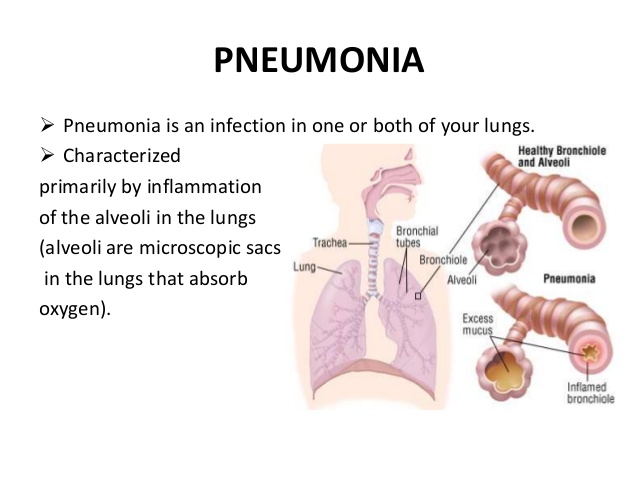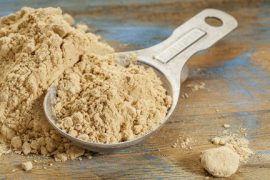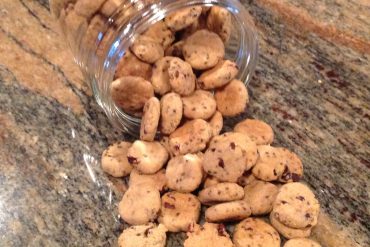What is pneumonia?
This is a contagious and serious illness. Pneumonia is a type of lower respiratory infection that can cause inflammation in one or both lungs. There are many forms of pneumonia that are caused by bacteria or viruses as well as less common causes such as fungi or parasites. The alveoli (air sacs) in the lungs can fill with fluid or pus that cause flu like symptoms that last for weeks and don’t respond to OTC (over the counter) medicines.

Signs & symptoms of pneumonia
Symptoms can vary from one person to another. The severity of this illness can depend on many factors including overall health, age, lifestyle factors such as diet , as well as what type of pneumonia you have. Many times the symptoms are similar to that of the cold or flu, but last significantly longer.
There are also different symptoms between viral and bacterial pneumonia. Bacterial pneumonia can result in higher temperatures and result in rapid breathing, sweating and higher pulse rates. In addition your lips can have a bluish tinge due to lack of oxygen.
Viral pneumonia can have symptoms closer to the flu, such as muscle aches and pains, mild fever, dry cough, weakness and headaches. Again, the symptoms persist and are not improved with time, rest and OTC medications.
To recap, some of the more common signs of pneumonia include:
Cough (without or with yellow or green mucous)
Fatigue
Fever, chills
Nausea, vomiting
Rapid heartrate
Shaking, sweating
Shortness of breath
Stabbing chest pain with each deep breath or cough
Wheezing
Causes & risk factors
There are many forms of pneumonia that are caused by bacteria or viruses as well as less common causes such as fungi or parasites.
Young children and individuals over 65 can be the most susceptible to pneumonia due to immature and weakened immune systems. In addition, smokers, people with asthma, COPD, cystic fibrosis or cancer are also susceptible.
Since this illness can be spread through coughing, sneezing, sharing food etc., individuals who live in close contact with others, such as college students or siblings that share a bedroom are also more likely to get sick.

Conventional treatments
Pneumonia is nothing to take lightly. If you suspect this illness, see your doctor asap to confirm your suspicions. Treatment will vary based upon the type of pneumonia you have. Bacterial pneumonia patients are usually given antibiotics and in some cases, may require IV’s, chest x-rays or hospitalization.
Individuals with mycoplasma pneumonia are given antibiotics, and may also be given anti-inflammatory medication or corticosteroids.

Natural treatments
There are many natural options for pneumonia symptoms that can help you to feel better and recover faster. They include basics such as adequate rest, healthy diet, supplements, treating fever as needed, as well as general management of symptoms.
Here are some natural options to discuss with your doctor/healthcare practitioner:
Astragulus-Strengthens the immune system and relieves lung inflammation.
Coltsfoot-Soothes irritated throat and relieves lung inflammation.
Echinacea-Boost immune system, fights infection, reduces mucous in lungs.
Elecampane-Relieves lung congestion caused by mucous.
Fenugreek Seeds-Reduces mucous in lungs, promotes sweating.
Goldenseal– Strengthens the immune system, clears up mucus and congestion.
Garlic-Kills bacteria, viruses and parasites. Allicin in garlic is both anti-bacterial and anti-viral.
Holy Basil Also known as Tulsi. Potent anti-bacterial.
Mullein-Has expectorant properties that loosen phlegm and thin mucous.
Oregano Oil-Anti-bacterial, anti-fungal, anti-microbial and anti-vital. Helps thin mucous.
Potassium Broth-Nourishing and healing broth.
Sesame Seeds-Reduces phlegm and lung congestion.
Turmeric-Anti-bacterial, anti-inflammatory and relieves lung congestion.

Prevention
If you are around people with pneumonia, consider wearing a quality charcoal mask.
Wash your hands frequently.
Get adequate rest.
Stay well hydrated with water and healthy fruit and vegetable juices.
Avoid soda, sugar and dairy products.
Improve gut health by adding probiotics, with supplements or probiotic foods.
Boost your immune system with supplements, herbs and foods such as: astragalus, echinacea, garlic, turmeric, ginger, licorice, vitamin C, goldenseal tulsi and mushrooms.
This article was originally posted at The Hearty Soul.








